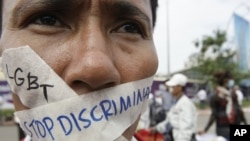Activists and members of Cambodia’s lesbian, gay, bisexual, transgender, queer and intersex (LGBTQI) community this week have raised concerns about ongoing discrimination against them, particularly at workplaces, which result in unemployment.
Speaking at a US Embassy-organized gathering on Wednesday night in Phnom Penh to celebrate Pride Month, the group said many of their members face on-going discrimination at workplaces and will lose their jobs immediately once they are discovered to be LGBTQI.
Chhun Mony Vechra, 36, an LGBTQI activist in Preah Sihanouk province and a teacher, said discrimination against the LGBTQI community remains strong in local communities of Preah Sihanouk province and other parts of Cambodia despite much advocacy and education about LGBTQI rights.
The activist further added that workplace discrimination makes it difficult for LGBTQI members to get decent employment.
“Another point is, discrimination at workplaces, especially transgender people find it hard to get jobs. They dress up as women at work but they face trouble when people find out [about their sexuality],” said Vechra.
“In a real-life example, which happened this month, a transgender person dressed up as a woman and applied for a job at a garment factory. No one noticed that she was man and dress up as a woman, so she worked there for a week. However, she was fired after her true sexual orientation was revealed.”
Thuok Phalla, 33, a transgender and health activist for Media One based in Siem Reap province said that she, too, has experienced similar workplace discrimination.
“We [LGBTQI people] have never had proper jobs to make a living because we are discriminated against at the workplace. Some workplaces and companies are scared of losing their reputation because of having us, for the way we dress up as women,” Phalla told participants during the celebration of Pride Month held at the US Ambassador’s residence in Phnom Penh.
“Therefore, we have a hard time to get proper jobs, except working at cosmetics and hair salons or working as sex workers,” Phalla added.
June is celebrated in the United States and worldwide as “Pride Month” to advocate for LGBTQI rights. Pride Month commemorates the Stonewall riots in June 1969 in New York when LGBTQI members staged protests to demand equal rights.
Pride Month was celebrated at the US Ambassador’s residence in Phnom Penh for the first time this year to allow LGBTQI members to network and build a greater community, said Rebecca Black, acting country director for USAID in Cambodia.
She continued that USAID has supported the building of the LGBTQI community since 2013 and that the community has been growing.
“I know it is not over, the challenge is still there, there’s still discrimination, there’s still unfair treatment. We will continue, here, many other parts of the world and the US,” said Black. “As you’ve heard the US Government stands with you, USAID stands with you and we will continue to do what we can.”
She added that USAID has supported many programs across Cambodia in building LGBTQI networks like Media One.
Gary Anderson, acting deputy chief of mission of the US Embassy to Cambodia, said the United States is a free country and always supports the full rights of LGBTQI people.
He continued that the embassy is standing with Cambodia’s LGBTQI community for their equal rights.
“LGBTQI persons – like all persons – must be free to enjoy their human rights and fundamental freedoms, including freedom of expression, peaceful assembly, and association, without fear of reprisal. As Americans, we place a high value on these rights and freedoms, which all persons deserve to enjoy fully and equally,” said Anderson.
“The United States stands firmly with you as you exercise your human rights and fundamental freedoms.”
The United States legalized same-sex marriage in 2015. Meanwhile, in May, Taiwan became the first place in Asia to legalize same-sex marriage.
Cambodia, however, still has a long way to go.
Prime Minister Hun Sen said in February that Cambodia embraces full rights for the LGBTQI community but needs more time to observe same-sex marriage trends.







